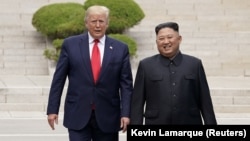Another summit between President Donald Trump and North Korean leader Kim Jong Un would hinge on Washington and Pyongyang agreeing on a denuclearization process through working-level talks, experts say.
"A summit appears likely," said Douglas Paal, vice president at the Carnegie Endowment for International Peace. "I hope staff-level talks resume and make progress toward any summit, not the other way around."
This week, Washington and Pyongyang seemed unopposed to having another summit, but suggested intermediary steps and agreements made on a denuclearization process might be necessary beforehand.
Speaking Monday on the sidelines of the U.N. General Assembly, Trump said a third summit with Kim "could happen soon," and added, "I want to know what's going to be coming out of it."
'Bold decision'
North Korea, in an apparent response to Trump, said Friday that it was expecting Trump to make a "bold decision" toward a breakthrough in currently stalled diplomacy.
Foreign Minister adviser Kim Kye Gwan said through the state-run Korean Central News Agency (KCNA) that another summit would not happen unless the U.S. changed its position of demanding denuclearization before granting major concessions.
Robert Manning, a senior fellow at the Atlantic Council, said, "Given the failure of previous summits [and] based on [Trump's] recent remarks, I think [Trump] wants to see some serious steps toward dismantling nuclear weapons resulting from senior working-level talks before giving away another summit."
Talks between Washington and Pyongyang have been stalled since the failed summit at Hanoi in February, when Trump rejected Kim's offer to dismantle a part of North Korea’s nuclear facilities in exchange for sanctions relief. Trump instead asked Kim to take steps toward complete denuclearization.
Kim promised Trump that Pyongyang would return to working-level talks with Washington when the two leaders met at an impromptu summit at the inter-Korean border in June.But they have yet to settle their differences over denuclearization and sanctions relief.
South Korean intelligence officials said Tuesday that working-level talks between Washington and Pyongyang would resume in a few weeks.Secretary of State Mike Pompeo, however, said Tuesday that the U.S. was unable to arrange working-level meetings with North Korea in September.
Paal said, "The most important factor is for the U.S. to lower its immediate requirements for progress toward denuclearization."
He added that the U.S. should lower its initial demand for North Korea's denuclearization, such as the "closure of test sites, complete closure of Yongbyon [nuclear facility], [and] closure of suspected uranium enrichment sites" and "seek to demonstrate a long-term commitment to de-nuking."
Bolton blamed
Trump indicated last week that he was open to pursuing a "new method" in nuclear negotiations with Pyongyang, as he attributed the failed talks with North Korea to former national security adviser John Bolton.
"I think John really should take a look at how badly they've done in the past and maybe a new method would be good," Trump said.
Manning, of the Atlantic Council, said, "The U.S. side has clearly indicated flexibility and a willingness to move forward based on reciprocal steps."
"So what is needed is the political will on the part of North Korea to pursue a reasonable deal that begins to dismantle their nuclear weapons program," he added.
North Korea welcomed Trump's reference to a "new method," which appeared to suggest Washington was open to taking a more flexible position and making smaller deals on denuclearization, in contrast to its demand in Hanoi for a big deal that required complete denuclearization upfront.
'Practical point of view'
North Korean diplomat Kim Myong Gil, who is expected to lead Pyongyang's working-level talks with Washington, on Friday praised "the wise political decision of President Trump to approach the DPRK-U.S. relations from a more practical point of view" in a statement released on KCNA. DPRK is an initialism for the Democratic People's Republic of Korea, the official name of North Korea.
Ken Gause, director of the analytics program at the CNA research group, pointed out that Trump's mention of "new method" did not mean he would grant sanctions relief that North Korea wants.
"President Trump gave no indication at the U.N. that he is willing to entertain sanctions relief, which is what North Korea wants," Gause said. "Absent U.S. concessions, I can't see Kim Jong Un agreeing to a third summit anytime soon. That is why Pompeo is not successful in getting working-level meetings started."
Gause said that unless the U.S. grants sanctions relief, Special Representative for North Korea Steve Beigun will have nothing to offer at the working-level talks.
"Only sanctions relief will move the denuclearization process forward," he said. "Otherwise, North Korea will begin to disengage from the U.S. and move quickly to secure a fully mature nuclear program."








